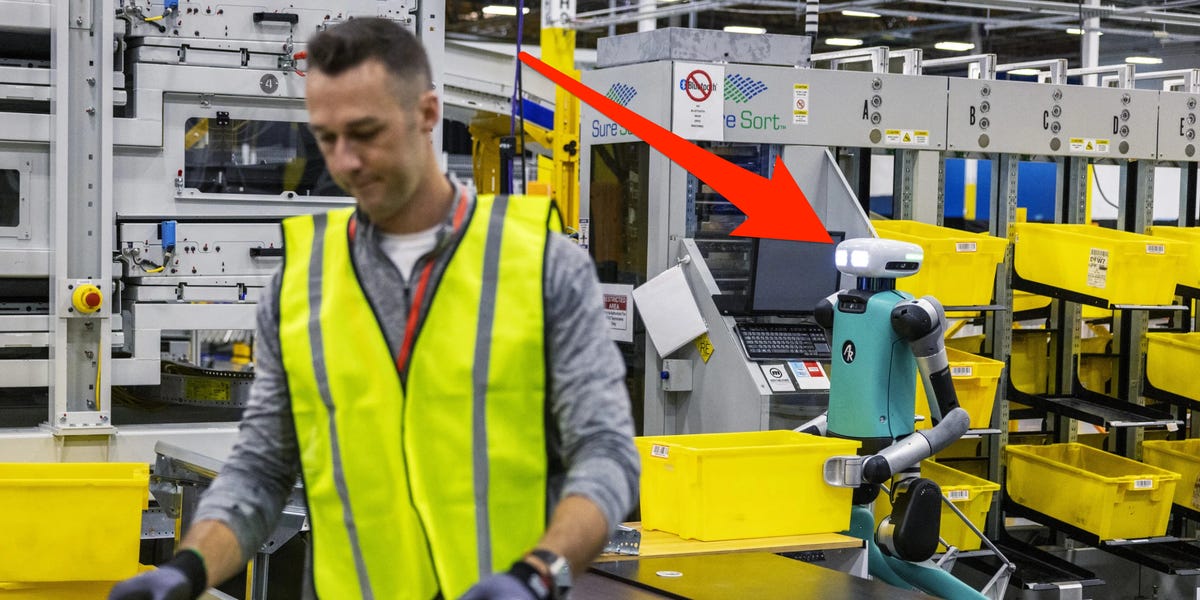I often hear people say there is no need to worry about robots taking jobs, as automation has always done that, but new jobs have been created. The problem with that line of thought is - what happens when AI & Robots can do all the new jobs too? They’ll be much cheaper. What business is going to survive paying human wages (+health +social security contributions, etc) - when another business can do the same with robots/AI for pennies?
At that point we’ll finally have to give up on capitalism, we’ll employ a UBI for everyone and live like a retired Picard.
How did the Picard family have an enormous house, and hundreds of acres of land in a socialist society?
You’d be better off asking Gene Roddenberry that. But TNG made it look awesome.
It sure did.
It bugged me the Raffi was depicted living in a trailer in the middle of nowhere in Picard, like she had been impoverished by getting kicked out of Starfleet, and complains about Picard having a nicer place. That’s not how shit is supposed to work in that world.
Postscarcity would mean that everyone could live in fancy vineyard if they wanted, and Picard just happens to have one with a personal history.
Exhibit 97 for why Picard was a terrible show that never should have been made.
So, TBH I don’t get the hate. There’s goofy bits in every series. I enjoyed it overall.
There was way too much hand waving in Picard for me, and not nearly enough substance.
At that point the working class gets so hungry that we wage a total war for our survival against the wealthy. Or we get propaganda and bread and circuses sufficient to keep us barely away from it
we wage a total war for our survival against the wealthy
That seems very dramatic. I wonder if the Covid pandemic is a more realistic example of how things will play out. It’s amazing how in the space of only several weeks in March-April 2020 the whole planet changed so dramatically, and yet in such a calm, orderly fashion.
Or we get propaganda and bread and circuses sufficient to keep us barely away from it
“Power concedes nothing without a demand. It never did and it never will. Find out just what any people will quietly submit to and you have found out the exact measure of injustice and wrong which will be imposed upon them, and these will continue till they are resisted with either words or blows, or with both. The limits of tyrants are prescribed by the endurance of those whom they oppress.”
–Frederick Douglas
I think a common misconception is that people will find new jobs. If I’m remembering correctly, studies on automation of furniture production found that displaced workers mostly just fell into poverty.
Certainly SOME people will find better jobs, but if it were simple and easy for people to find “high skill jobs” instead of thier warehouse work, they would have already done it.
And yet, nobody complains about the mechanical loom anymore.
If you’ve invested a lot training to be a master weaver, yeah, there’s no getting those years back when you’re replaced. That the number of jobs stays the same is completely and verifiably true, but there’s definitely losers every step of the way, who basically just get knocked down to unskilled labour, or who have to relocate altogether (but usually more winners).
People do lament poverty and the consolidation of wealth into owners through the displacement of the worker.
Just because we run swiftly in front of the whip of capitalism does not mean we should dismiss those who trip and fall. We should be angry that there is a whip at all.
People do lament poverty and the consolidation of wealth into owners through the displacement of the worker.
If it happened, yeah. Inequality is actually way lower than in the late 1700’s, though. There’s other things that can feed into it or pull it back.
As for the plight of the weavers, I agree, but the root problem isn’t automation. You could say it’s “capitalism”, but I prefer to be more specific. We have a situation where stages of life that everyone is supposed to achieve are exposed to market risk, and they shouldn’t be. A basic income would be good, and maybe some sort of insurance scheme for senior workers that offers a safety net if their industry collapses.
The issue I have with the far left, if that’s where this is going, is that a detailed alternative is never supplied. When pressed, some of them point to Stalinist utopias I don’t believe actually existed, others point to anarchist projects that never quite got off the ground, but neither can actually explain either system at a granular level.
True! I personally feel that UBI would be the easiest pill for the West to swallow. It is totally compatible with capitalism, and addresses the most urgent needs of individuals.
I feel like a slightly more radical solution which is also compatible with capitalism would be laws requiring substantial stake in ownership in companies for workers. Proportional to the quality of employees and time worked. Meaning, that if you work 15 years at Amazon and get replaced by a robot, you see some passive income over time for the value you contributed. Likewise, the sale or liquidation of a company would see past workers getting some sort of payout.
Worker ownership also has potential, and I support it! The one sticky issue is things like tech startups, with few employees but large startup costs.
Then new jobs will open.
I think that absolutely is the point of transition. Making a few jobs obsolete is progress, making them all obsolete is new and uncharted territory.
Honestly we can’t fight the inevitable. The solution for those workers is getting a education and specializing. Its doesn’t mean a university either it can be a trade school or even an apprenticeship
There’s only so many tradesmen that are needed though. You get 20% of the unskilled labour market to specialize and all of a sudden every trades sector is over saturated.
Which means all the salaries go down, and the rich just keep getting richer.
Usually what’s happened in the past is that new jobs become economical. If every possible job is replaced then that’s the new territory.
I’m highly, highly skeptical this robot doesn’t suck, though. They say it won’t fully replace their workers, and I suspect that’s because it’s going to get stuck around a tricky corner or tangled in a loose pieces of packing tape constantly.
Then instead of a warehouse full of people, Amazon will end up with a warehouse full of robots, and a few robot babysitters.
Best case, yes exactly. But again, that’s happened before many times though (once upon a time, there was no conveyor belts or cranes in a warehouse either, there was guys doing that work) so I’m not too worried. Worst case it just fails.
The difference is that conveyor belts weren’t poised to impact 80% of all jobs on the planet, AI is.
Okay, modern agriculture then. Before industrialisation, 98% of people worked in agriculture as basically peasants. Now it’s pretty much exactly the opposite, with 2% working in something related.
I agree AI could be a major problem if it gets even a little bit better. This specific story isn’t an example though.
That sounds like a justification for not practicing financial literacy.
Then people will find new things to do. The extra man hours can be dedicated towards the manufacture of luxury products, art, and other less utilitarian items.
I do worry about the transition period, however. Mass unemployment isn’t a permanent problem, but in the short term it can be a very severe problem.
In the words of my old economics teacher, subsidizing a steel plant just because you don’t want to fire people may be inefficient, but do you really want to go walk in and tell a bunch of big steel workers their work is no longer worth it?
I don’t believe that’s how it works. Right now there is a ton of demand for skilled labor and I don’t foresee that changing
The unskilled labour market is a lot of people. Using Canadian job data, assuming “service” jobs to be “unskilled” and “goods producing” to be “skilled” that’s 14M to 3M jobs.
Take just 20% of the unskilled jobs market and turn it to skilled jobs you almost double it to 5.8M
I don’t think you can almost double the skilled labour market and not have negative consequences, there’s not that much demand.
I mean replacing jobs that are basically just being a humanoid robot is actually not a bad thing…
I get what you mean, but what are millions of people going to do for work instead?
There are enough other places that need workers…
Digit costs about $10 to $12 an hour to operate right now, based on its price and lifespan, but the company predicts that cost to drop to $2 to $3 an hour plus overhead software costs as production ramps up, Agility Robotics CEO Damion Shelton told Bloomberg.
So the guy selling robots makes that unsubstantiated claim and works in a qualifier about software fees because even using fake numbers they know they’ll never actually be that low.
Also, nothing stops encouraging the robots to join a union using the methods Teamsters usually employ.
What’s their productivity compared to a person? And uptime with maintenance or troubleshooting? I don’t doubt that eventually they’ll be better, but I don’t know if that time will be any time soon.
This is actually quite terrifying. This is going to affect millions, possibly billions of people.
I’m almost certain these robots suck, don’t panic. We can barely make a car with no limbs to manage, on a marked road, behave reasonably.
I don’t think so that this robots replace Humans in the near time. Every single Human growed up with a braine optimized for spatial body movement in Millions of Years. Consider this! If you see videos how this Humanoid robots move, you see that we are still long away from a time with human-like robots.








